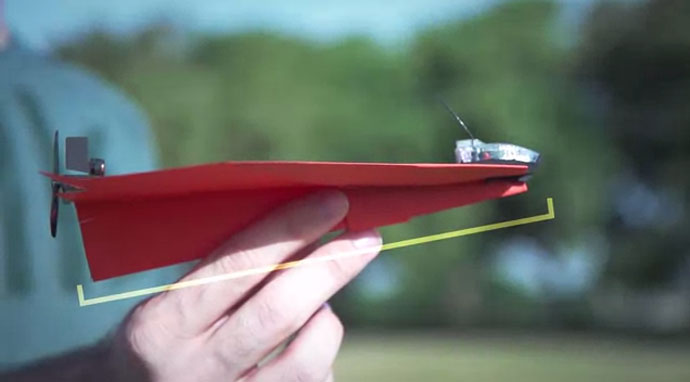Smartphone-Controlled Paper Airplane Has Raised Nearly $600,000 On Kickstarter
PowerUp Toys is giving new life to an old idea. Its creator Shai Goitein started a Kickstarter campaign to fund PowerUp 3.0, a small propeller attachment for a paper airplane that’s fully controllable from a smartphone or tablet.
How It Works
PowerUp 3.0 is as simple as it seems, with just four steps to use it: fold it, attach it, connect it, fly it.
First make a paper airplane; the Kickstarter even provides a diagram, so you can’t get this wrong. Then clip the Smart Module onto the plane and open the app, which will be available for both iOS and Android. Next, push up the throttle from your phone and launch your paper airplane into the air. You’ll be able to control the entire flight. Steer the plane by tilting your phone left or right, and adjust its altitude by adjusting the throttle.
The tiny attached battery lets you fly for 10 minutes at a time. And don’t worry about crashing, as the PowerUp 3.0 is entirely crash-proof.
Other PowerUp Products
PowerUp 3.0’s predecessor, the 2.0, is a similar but simpler concept. It’s a battery-powered propeller meant to make paper airplane flights last longer. However, each battery charge only lasts for about 10 seconds of flight time, and there’s no phone app to let you control the flight.
PowerUp also has a product for paper boats. It’s the same concept, but simpler still. The wind-up motor takes no batteries and lasts 10 seconds at a time. But it does come with some extras. The kit comes with two sheets of waterproof treasure map paper that can be reused after each boat. It also includes a flag, tiny pirate and anchor. This kit is the company’s most inexpensive product at $12.
Backing PowerUp 3.0
The simplicity of PowerUp products is genius, and apparently others agree. Just two weeks into the two-month Kickstarter campaign, PowerUp 3.0 has already received about $585,000 in backing, more than 10 times its original goal of $50,000.
The project’s 10,000 backers may be drawn by the price tag, which is relatively low compared to many popular items on Kickstarters. Pledging just $30 will guarantee you a “barebone” package, which includes the module itself and a spare propeller, but no paper or battery pack.
Backers can expect to receive their toys in May 2014.










































